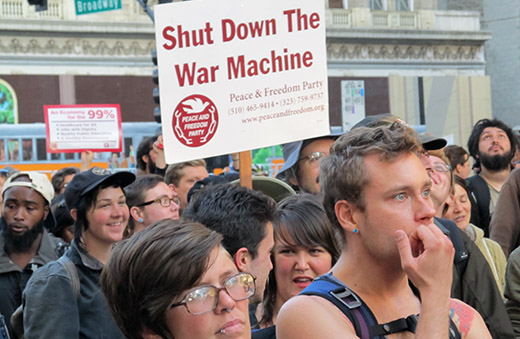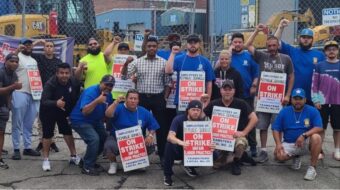
OAKLAND, Calif. – In the wake of the early morning police eviction of Occupy Oakland protesters from their encampments Oct. 25, confrontation between protesters and police came to a head in the early evening after protesters regrouped at the city’s main library to march through the city.
After rallying on the library steps, a crowd of about 1,000 set out through downtown streets, with police blocking traffic for them. But what started as an energetic, loud and peaceful march soon took on a different character. Participants said as the march approached police headquarters, police pulled two people out of the crowd and arrested them. Marchers then surrounded the arresting officers, shouting, “Let them go!” As the crowd grew, police fired flash-bang grenades and tear gas. Observers said many officers had been splattered by paint, and some marchers had also thrown water bottles.
As the crowd veered toward the now-deserted campsite, near City Hall, police refused them entry, declaring the march an illegal assembly, and warning that they would use chemical agents. Several hundred protesters continued to surge through city streets, confronted with tear gas, projectiles and police batons. At least one protester, Iraq War veteran Scott Olsen, was struck in the head by a police projectile. Olsen was reported in serious but stable condition at Highland Hospital.
Police said a number of officers had been “assaulted, doused with hazardous materials and hit with large rocks and bottles” before the dispersal orders were issued.
The eviction of the Occupy Oakland campers has created significant controversy in the city, with Mayor Jean Quan, Acting Police Chief Howard Jordan and others citing major health and safety concerns, and others sharply criticizing the city’s actions.
Soon after the eviction, the Alameda Labor Council posted a resolution on its web site, saying it “shares the outrage, frustration and resolve of the protesters, commits to the fight, and goes on record in support of the Occupy Oakland and the entire Occupy Wall Street movement.” The resolution further backed protesters’ right to peaceful assembly and opposed “any efforts to unreasonably evict protesters based on unsupported claims of public safety.” It said the mayor and the City Council “are on the wrong side of history,” and called on the city to drop charges against those arrested and restore the occupation.
The California Nurses Association/National Nurses United issued a similar statement, and theAsian PacificEnvironmental Network issued a petition calling on the mayor to stop police repression against the protesters.
The previous weekend, observers had called conditions in the camp good and improving. But some who stayed in camp overnight reported that drinking, drug use, sexual harassment and some violence did occur at night, with campers feeling they could overcome the problems.
Until a few days before the eviction, campers had rejected the idea of meeting with the city to work out an agreement. At that point the camp’s general assembly said city officials could participate as individuals in the camp’s consensus process.
Speaking on public radio station KQED Oct. 26, City Council President Pro Tem Ignacio de la Fuente pointed out that Mayor Quan “tried from the beginning to establish a dialogue” with protesters and to allow them to use the plaza during the day, and noted what he called “the infiltration” of people totally opposed to the police.
Others urged an emphasis on nonviolence, and pointed out that the clashes obscured the real reason for the occupation.
A protester interviewed on radio station KPFA said he felt participation in the demonstration would have been much better if people “would just stop throwing bottles at the cops. I understand frustration with the police. But what’s throwing a bottle going to solve? Nothing. As soon as it’s thrown, they gas everybody. If we could go one afternoon without gassing, we could fill up a three block radius around here.”
Photo: Marilyn Bechtel/PW










